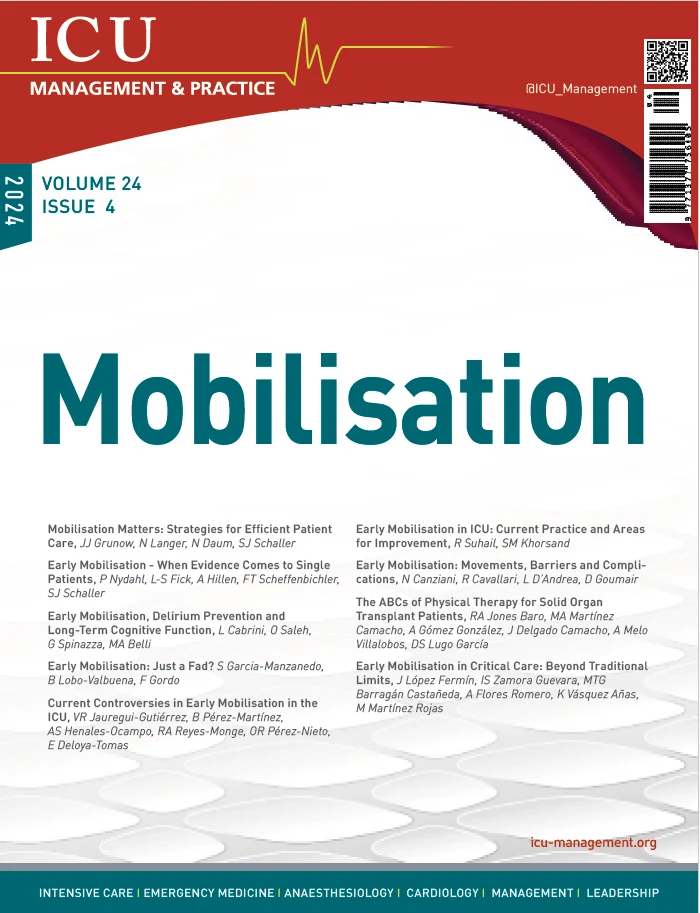
ICU Management & Practice, Volume 24 - Issue 4, 2024
Download PDF |
 |
| PRINT OPTIMISED |
Download PDF |
 |
| SCREEN OPTIMISED |
Editorial
Mobilisation
Early mobilisation in critically ill patients can improve outcomes during and after critical care. However, it requires a coordinated effort from the multidisciplinary critical care team. Effective early mobilisation strategies in the ICU require a structured and individualised approach, ensuring safety and maximising benefits for critically ill patients. While beneficial, early mobilisation presen...
Cover Story
Mobilisation Matters: Strategies for Efficient Patient Care
Post-Intensive Care Syndrome encompasses long-term physical, cognitive, and mental impairments, impacting patients' quality of life. Early mobilisation is known to improve functionality. However, clinical practice often falls short of guidelines due to barriers like haemodynamic and respiratory instability, staff shortages, and knowledge gaps. Regular multi-professional assessments and educational inter...
Early Mobilisation - When Evidence Comes to Single Patients
Early mobilisation within 72 hours of ICU admission mitigates risks including reduced functionality and cognitive decline in critically ill patients, improving outcomes such as mobility and quality of life. Overcoming barriers through flexible staffing, protocols, and personalised care strategies is essential to humanising critical care in daily practice. We apply this evidence-based approach to Mr Smit...
Point-of-View - Sepsis
Abionic: Vision, Key Products and Strategic Direction
Abionic SA has appointed Patrick Pestalozzi as CEO. With three decades of global experience in management consulting and entrepreneurship, Patrick has been instrumental in creating and developing deep-tech ventures. His diverse healthcare background positions him to lead Abionic's next growth phase. ICU Management & Practice interviewed Patrick about his vision for the company. What is your visi...
Early Mobilisation, Delirium Prevention and Long-Term Cognitive Function
Early mobilisation showed promising positive effects in preventing and shortening delirium and improving long-term cognitive function. Further research is required to confirm its benefits and to identify the best protocol. In recent years, an increasing demand for critical care services (and Intensive Care Unit (ICU) admissions) has been reported, together with a decrease in short-term mortality (N...
Early Mobilisation: Just a Fad?
A review of recent evidence on early mobilisation and rehabilitation and what remains to be defined. Critical illnesses encompass a broad spectrum of pathologies that require support for different organs. This often leads to prolonged bed rest and secondary immobilisation, which ultimately fosters the development of Intensive Care Unit-acquired Weakness (ICU-AW). ICU-AW is the onset of muscle weakn...
Point-of-View - Landiolol and Atrial Fibrillation
ESICM Webinar – Cardiovascular Management After Surgery
In a webinar at the ESICM Congress, Dr Aretha and Dr Garcia-Alvarez spoke about cardiovascular management after surgery. More specifically, Dr Aretha spoke about the management of post-operative atrial fibrillation, and Dr Garcia-Alvarez spoke about the importance of early application of vasopressin in septic shock patients. Post-operative atrial fibrillation (POAF) can be triggered by acute fa...
Current Controversies in Early Mobilisation in the ICU
This article will address current and controversial topics regarding early mobilisation and respiratory therapy in critically ill patients in the Intensive Care Unit (ICU). We will explore the implications, challenges, and potential benefits related to these interventions, highlighting the need for ongoing research and discussion in this evolving field. Holistic management in the ICU integrates...
Early Mobilisation in ICU: Current Practice and Areas for Improvement
A literature review to highlight how early mobilisation can improve patient-important outcomes, including length of ICU and hospital stay, duration of mechanical ventilation and overall quality of life in ICU survivors and the risks associated with EM and barriers to safe implementation of current practices, future directions, and the need for more studies to identify effective early mobilisation proto...
Early Mobilisation: Movements, Barriers and Complications
Early mobilisation includes several progressive kinds of movements. Many barriers and safety concerns must be addressed to allow a smooth and effective introduction of this procedure in the ICU daily practice. Early mobilisation is recommended as part of a multi-component, nonpharmacological strategy to improve physical, mental and cognitive outcomes of critically ill adults. Physical rehabilit...
The ABCs of Physical Therapy for Solid Organ Transplant Patients
Physical therapy is essential for improving outcomes and quality of life in solid organ transplant patients. This paper outlines the fundamental principles ("ABCs") of physical therapy, focusing on evidence-based practices and pre- and post-transplant care to guide healthcare professionals in optimising recovery. Physical therapy is essential in the postoperative care of patients who have under...
Early Mobilisation in Critical Care: Beyond Traditional Limits
Early mobilisation in critical care significantly improves outcomes in critically ill patients. Overcoming boundaries requires a proactive approach, training, research and multidisciplinary collaboration. Early mobilisation in the critically ill patient is essential to mitigate the adverse consequences of bed rest and improve outcomes and cost reduction. The absence of muscle contraction results in...
Agenda
Upcoming Events/Congresses
For a full listing of events, please visit https://iii.hm/icuevents2024 1-2 Anaesthesia & Critical Care 2024 London, UK https://iii.hm/1rq5 2-4 Paediatric Critical Care Society Conference 2024 Liverpool, UK https://iii.hm/1rq6 5-9 ESICM LIVES 2024 Barcelona, Spain https://iii.hm/1rq7...
















